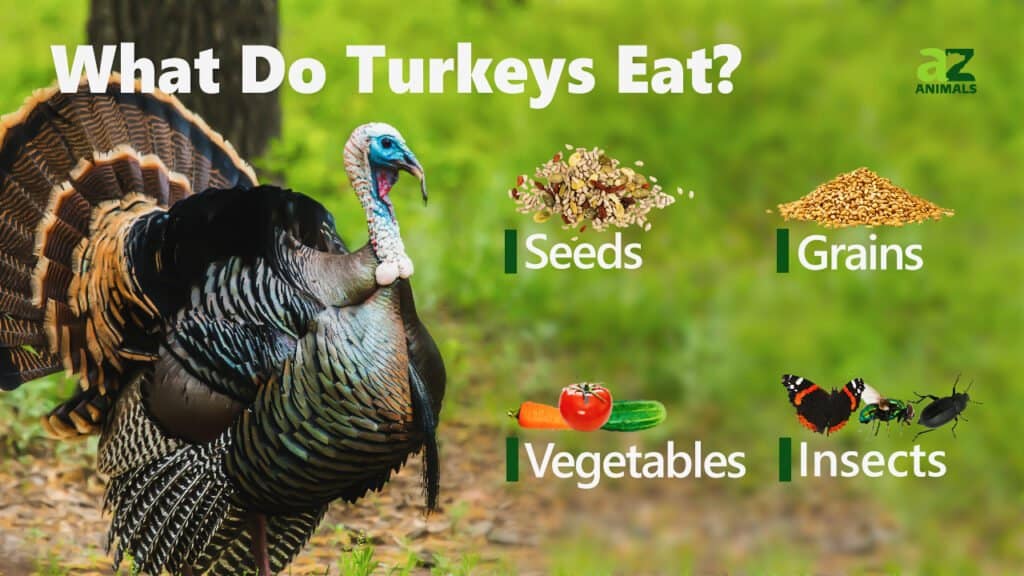When it comes to turkeys, we often wonder what their favorite food might be. As birds known for their strong appetite, turkeys have a variety of food preferences that contribute to their overall health and well-being. Let’s explore the typical diet of turkeys and discover their favorite food choices.
The Natural Diet of Wild Turkeys
In the wild, turkeys have a diverse diet consisting of both plant matter and small creatures. They are omnivorous birds and tend to forage for food in forests, meadows, and grasslands. Some of the staple food sources for wild turkeys include:
- Seeds and nuts – Turkeys consume a wide range of nuts, such as acorns, hickory nuts, and beech nuts. These provide essential fats and proteins.
- Berries and fruits – They enjoy feasting on various berries, such as blackberries, raspberries, and blueberries, which are rich in vitamins and antioxidants.
- Insects and small reptiles – Turkeys are opportunistic predators and catch insects, spiders, and even small reptiles like lizards and snakes when they come across them.
- Grains and grasses – They also consume different types of grains and grasses like corn, wheat, oats, and grass seeds, which provide them with carbohydrates and fiber.

Credit: a-z-animals.com
Domesticated Turkeys’ Preferred Eats
Domesticated turkeys, on the other hand, have a slightly different favored diet compared to their wild counterparts. They are typically given specially formulated feeds to ensure proper nutrition. Some of their favorite foods include:
| Food Type | Description |
|---|---|
| Pellets or Crumbles | These are commercially produced feeds containing a balanced mixture of grains, protein, vitamins, and minerals, providing complete nutrition for domesticated turkeys. |
| Fruits and Vegetables | Turkeys enjoy eating a variety of fruits and vegetables, such as apples, carrots, and leafy greens, which can be given as treats or added to their regular diet. |
| Mealworms | Mealworms are a popular choice to provide extra protein for domesticated turkeys. They are a source of essential amino acids and can be given as occasional treats. |
| Grains and Corn | Similar to wild turkeys, domesticated ones also appreciate grains and corn for their carbohydrate content. These can be provided in moderation to ensure a balanced diet. |

Credit: www.cnn.com
Additional Considerations for Turkey Diet
While turkeys have their favorite foods, it’s important to note that their diet should be carefully balanced to meet their nutritional requirements. When feeding turkeys, it’s crucial to:
- Provide a mix of protein, carbohydrates, fats, vitamins, and minerals for overall health.
- Ensure access to fresh and clean water at all times.
- Avoid harmful or toxic food items such as chocolate or avocado.
- Consider consulting with a veterinarian or avian specialist for specific dietary recommendations based on the turkey’s age, breed, and overall health.
By understanding a turkey’s favorite foods and providing a well-balanced diet, you can ensure that these fascinating birds remain healthy and happy.
Frequently Asked Questions For What Is A Turkey’s Favorite Food,
What Do Turkeys Like To Eat The Most?
Turkeys love to eat a variety of foods such as seeds, fruits, insects, and small reptiles, but their favorite food is acorns. Acorns are high in fat and provide essential nutrients for turkeys.
How Do Turkeys Find Their Favorite Food?
Turkeys have an excellent sense of sight and smell that helps them forage for their favorite foods. They use their keen eyesight to spot food from a distance and rely on their sense of smell to detect food sources nearby.
Why Are Acorns The Favorite Food Of Turkeys?
Acorns are the favorite food of turkeys because they are a good source of energy, providing essential fats and carbohydrates. They also offer a variety of nutrients that are beneficial for the overall health of turkeys.
Are There Any Other Foods That Turkeys Enjoy?
In addition to acorns, turkeys enjoy consuming berries, small insects, seeds, and green vegetation. These foods provide a balanced diet for turkeys and contribute to their overall well-being.

Leave a Reply